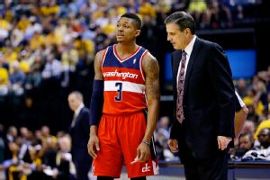|
Sometimes, before shuffling off of this playoff coil, a team will take a last gasp. But rarely is it a full-throated roar. The Wizards, after an out-of-nowhere 23-point win in Indiana against the best regular-season home team in the NBA, are standing atop their deathbed and ripping out the oxygen tubes. Marcin Gortat, who became the first Wizards player with at least 30 points and 15 rebounds in a playoff game since Moses Malone in 1987, felt far from expired. “At some point, in the middle of the game, it was just fun to be in the game,” Gortat told reporters. “Everything works, you feel immortal.” Essentially, this is Wizards basketball. Not the blowout of the East’s best regular-season team but the fact that no one saw it coming. At 44-38, the pre-playoff Wizards put every interested heart and mind through an industrial-strength dryer cycle. With each loss to the Pacers in this conference semifinals series, the same Wizards who almost swept the favored Chicago Bulls looked more recognizable: a frequent, crippling dependency on inefficient jump shots, a tendency to replace weapons rather than adapt them and, most painfully, an inability to finish out games that seem firmly within their grasp. After blowing a 19-point lead at home in Game 4, the Wizards had lost 12 games this season in which they led by double digits. Close losses are nothing new, either. No other team this season attempted more “clutch” shots, or played more “clutch” minutes (defined as occurring in the last five minutes of a game when a team is leading by five or fewer points). But the Wizards were just 20th-best in the league at making those clutch shots, resulting in an inordinate amount of local heartbreak. Before Game 5, it had been a trying second round for John Wall, who had as many turnovers (12) in two games at the Verizon Center against the Pacers as he did in the entire series against the Bulls. Passing up a wide-open, potentially game-tying 3-pointer in Washington on Sunday with under a minute left in favor of a chance for Bradley Beal to take the shot -- whether it was the right decision or not -- was a visible indication of how far undone Wall had come. Flooded by a chorus of encouragement, advice and criticism, Wall receded into his own mental hellscape after Game 4. “Well, ever since that game, I haven’t really talked to nobody. … All day yesterday, I just sat in my room and watched movies,” Wall confessed at the postgame lectern after a redemptive 27-point performance in Game 5. “You can get down on yourself pretty easy.” There were two voices, however, that cut through the static. When Wall confided to Randy Wittman after Game 4 that he had no idea how to rehabilitate his game, Wittman told him -- with typical Wittman-esque frankness -- that he never wanted to hear the usually self-assured franchise centerpiece say that again. Wittman followed up with a text on game day. After the game, Wall told the media that it read “Just believe. Just believe in yourself, John Wall.” If that sounds like the final chapter of a self-help book on the rack of one of America’s now-defunct bookstores, then surely you’ll forgive Wall for needing the nudge. The 23-year-old guard had less than 48 hours between the two biggest games of his young career. Gortat, a conspicuous nonfactor in Games 3 and 4, pounded his point guard on the chest twice just after the starting lineups were called and forced a reluctant Wall, drowning in the burgeoning tide of playoff pressure, to hear one last thing: “No, John, there’s just one thing I’m going to tell. I’m with you. It doesn’t matter which way it would go, I’m supporting you,” Gortat recounted in a postgame monologue.  It’s impossible to tell whether Gortat’s promise was the life preserver Wall and the Wizards needed, but here this absurd, sometimes great, sometimes awful team is, the last unknown value left standing in an Eastern Conference playoff bracket otherwise populated by familiar faces. It’s impossible to tell whether Gortat’s promise was the life preserver Wall and the Wizards needed, but here this absurd, sometimes great, sometimes awful team is, the last unknown value left standing in an Eastern Conference playoff bracket otherwise populated by familiar faces.
Eventually, these Wizards will go under. They might bury themselves, as they did in Game 3, where the team’s offense crossed the event horizon of the Pacers' defense, blindly firing up hopeless shots. Or they might go the way of the rest of their unready playoff kin, simply beaten by a better unit in this round or the next. For a 44-win team that just a few weeks ago seemed pleased just to be in the playoffs after so many consecutive lottery appearances, staving off elimination in a second-round playoff game on the road is unexpected. It’s also something that resembles growth. As the Wizards prepare for a Game 6, the up-and-down season that wouldn’t have qualified for the playoffs in the West is fading from collective memory. And that’s a good thing. Even though this isn’t Washington’s year to make a play for the throne, it was important for the Wizards to become relevant again in the eyes of potential free agents. When Washington throttled the Bulls, it inspired an incipient belief that the Wizards of the regular season had finally grown beyond their inconsistent roots. That wasn’t quite right. Alternatively, a fatal loss in Game 5 seemed inevitable after three consecutive demoralizing defeats. But this is a team that punishes faith and doubt equally. Just as you're about to shovel the last pile of dirt on a season run past its expected course, the Wizards look up, wink and say "not yet."
|

